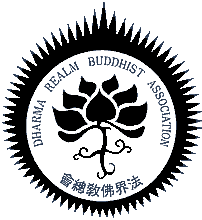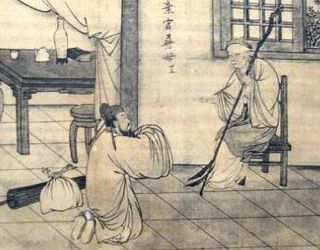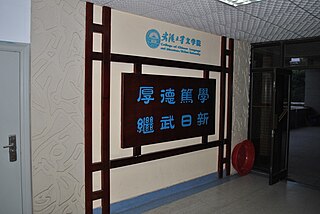
In Confucian and Chinese Buddhist ethics, filial piety is a virtue of respect for one's parents, elders, and ancestors. The Confucian Classic of Filial Piety, thought to be written around the Qin-Han period, has historically been the authoritative source on the Confucian tenet of filial piety. The book, a purported dialogue between Confucius and his student Tseng Tzu, is about how to set up a good society using the principle of filial piety. Filial piety is central to Confucian role ethics.

Wuhan University is in Wuhan, Hubei. It is one of the most prestigious and selective universities in China, which has been selected as a Chinese Ministry of Education Class A Double First Class University. It was one of the four elite universities in the republican period and also one of the oldest universities in China. In 1948, University of Oxford in the United Kingdom wrote to the Ministry of Education in China, confirming that undergraduate students at Wuhan University with degrees in liberal art and science, who had an average grade above 80 would be awarded "the senior status of Oxford". Wuhan university is located at Luojia Hill, with palatial buildings blending Chinese and Western styles. It is regarded by many as one of the most beautiful campuses in China.

The Dharma Realm Buddhist Association is an international, non-profit Buddhist organization founded by the Venerable Master Hsuan Hua in 1959 to bring the orthodox teachings of the Buddha to the entire world. DRBA has branch monasteries in many countries and cities, including San Francisco, Los Angeles, Seattle, and Vancouver, as well as in Malaysia, Taiwan, Hong Kong, and Australia.

The Classic of Filial Piety, also known by its Chinese name as the Xiaojing, is a Confucian classic treatise giving advice on filial piety: that is, how to behave towards a senior such as a father, an elder brother, or ruler.

A Chinese independent high school is a type of private high school in Malaysia. They provide secondary education in the Chinese language as the continuation of the primary education in Chinese national-type primary schools. The medium of instruction in these schools is Mandarin with simplified Chinese characters writing.

Nicolas Trigault (1577–1628) was a Walloon Jesuit, and a missionary in China. He was also known by his latinised name Nicolaus Trigautius or Trigaultius, and his Chinese name Jin Nige.

Imee Ooi is a Chinese-Malaysian record producer, composer, and singer who composes and arranges music for classic Buddhist chant, mantra, and dharani. She performs her compositions in Sanskrit, Pali, Tibetan, and Mandarin. In 1997 she founded a record label, I.M.M. Musicworks, to publish her music. To date, she has released more than 40 albums.
The Malaysian Buddhist Institute is a Buddhist institute of higher education providing formal training in the Chinese language to prepare candidates for the sangha orders in the Mahayana tradition. It is located in Penang, Malaysia. Established on September 18, 1969 through the efforts of the Venerable Chuk Mor, the institute is under the auspices of the Malaysian Buddhist Association.
Tatsuo Nishida was a professor at Kyoto University. His work encompasses research on a variety of Tibeto-Burman languages, he made great contributions in particular to the deciphering of the Tangut language.
Gong Hwang-cherng (1934–2010) was a Taiwan Chinese linguist who specialized in Sino-Tibetan comparative linguistics and the phonetic reconstruction of Tangut and Old Chinese. He was born 10 December 1934 at Yunlin County in Taiwan, and graduated from National Taiwan Normal University in 1958 with a degree in English. He earned his PhD in 1975 from Ludwig Maximilian University of Munich in Germany, and was a research fellow and later professor at Academia Sinica in Taiwan. He was elected an honorary member of the Linguistic Society of America in 2001, and an academician of Academia Sinica in 2002. In 2006, he received a life achievement award from the Linguistic Society of Taiwan.

The Twenty-four Filial Exemplars, also translated as The Twenty-four Paragons of Filial Piety, is a classic text of Confucian filial piety written by Guo Jujing (郭居敬) during the Yuan dynasty (1260–1368). The text was extremely influential in the medieval Far East and was used to teach Confucian moral values.
Quan Hansheng was a Chinese Economic historian. Quan's research focused on Chinese monetary history, commodity prices and foreign trade. He was an Academician of Academia Sinica, and he held professorships at National Taiwan University and The Chinese University of Hong Kong.

The Pearl in the Palm or the Timely Pearl is a bilingual glossary between the Chinese and Tangut languages. It survives as a single complete copy of a 12th-century woodblock printed book that was discovered in the Tangut city of Kharakhoto. In addition, a single page from a different copy of the same edition of the Pearl in the Palm was found at the Northern Mogao Caves in 1989. The book transcribes the pronunciation of Chinese words into Tangut characters, and the pronunciation of Tangut characters into Chinese characters, and so is a very important source for Tangut historical phonology, and was the primary source before the publication of monolingual Tangut dictionaries.
The Chinese Language Standardisation Council of Malaysia, abbreviated Yufan is the body charged with regulating the use of the Chinese language in Malaysia under Ministry of Education (Malaysia).
Institute CECE, abbreviated as CECE, is a non-profit, private early childhood education college in Malaysia, registered with Ministry of Higher Education (MOHE). It is located in Setapak, Kuala Lumpur, adjacent to Tunku Abdul Rahman University College Kuala Lumpur Main Campus. The institute was established in 1993 and was the only private and non-profit institution of higher learning, concentrating solely on pre-school teachers’ training in Malaysia.

Wuhan University College of Chinese Language and Literature is a school that awards undergraduate and graduate degrees with majors related to Chinese language and literature. Established by Wuhan University in 1917, the college is categorized under the Faculty of Humanities. The dean is Xianfeng Tu. The college was ranked among the top ten in a survey conducted by the Ministry of Education of China.
The University System of Tunku Abdul Rahman (USTAR) is the organizational body that includes 4 private institutions of higher learning in Malaysia. It sets goals to promote vocational education in the country. Recently, committee members of USTAR paid a visit to Australia and Taiwan.
Zhou Qun, courtesy name Zhongzhi, was an official, astronomer and diviner who served under the warlords Liu Zhang and Liu Bei in the late Eastern Han dynasty of China. Two of his interpretations of comets are preserved in volumes 102–104 of the Book of the Later Han, presumably through quotation by Qiao Zhou.
Chen Zhi is a Chinese scholar and researcher in classical Chinese Studies, the Vice President of Beijing Normal University-Hong Kong Baptist University United International College (UIC) and Director of the Jao Tsung-I Academy of Sinology (JAS) at Hong Kong Baptist University.
Fo Guang Shan Temple is a Buddhist temple located in Bantu Street of Tawau, Sabah, Malaysia. It is one of the overseas temple for Fo Guang Shan movement which is originated in Taiwan.













